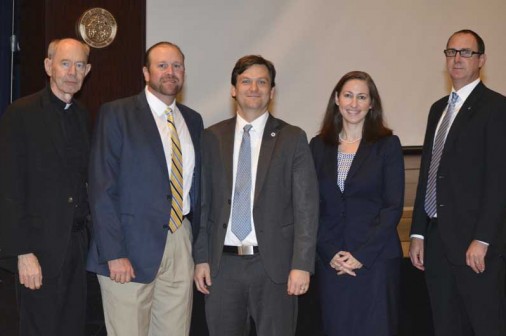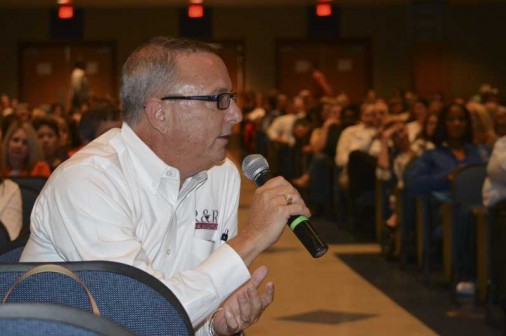Coroner, DEA Agent Bring New Jesuit Parents Up To Date

Jesuit High School president Fr. Anthony McGinn, S.J., ’66, DEA Agent Kevin Treigle ’94, Orleans Parish Coroner Jeffrey Rouse, M.D., ’92, Jesuit guidance department director Mary Favalora, and principal Peter Kernion ’90 take a moment for a picture after Thursday night’s Town Hall Meeting.
Parents with sons new to Jesuit High School filed into the Auditorium on Sept. 10 for a presentation dubbed “Challenge of Parenting in Today’s Culture.” The evening’s focus was on the role of parents in helping their sons make healthy choices, especially with regard to avoiding alcohol and drugs.
Sponsored by Jesuit’s guidance department, the town hall meeting featured presentations by three speakers, after which the floor was opened up for questions.
After an introduction by guidance department chair Mary Favalora, Jesuit High School president Fr. Anthony McGinn, S.J., ’66, took to the podium to focus on proactive efforts that parents can undertake to raise well-adjusted young men. “If you take one thing away from tonight, let it be this” McGinn told the audience. “Early onset of alcohol consumption has a tremendous effect on later life. Young men who start drinking at the age of 14 are four times more likely to become alcoholics than those who start at 21.”
Orleans Parish Coroner Jeffrey Rouse, M.D., ’92, picked up where McGinn left off. “THE gateway drug,” he told parents, “is alcohol.”
Rouse then segued into a collegiate-level neuroscience lecture, calling the 1990s the dark ages of understanding the brain. Brain scanning technology, he told the crowd, has proved conclusively that the brain is still developing well into a person’s 20s. Alcohol and other illegal substances, he said, are indiscriminate killers of developing brain cells.
It’s the prefrontal cortex that is the last thing to develop, according to Rouse, which explains why even seemingly intelligent children who do not abuse substances still tend to engage in risky behavior. “It really may be helpful,” he advised parents, “to think of your child as brain damaged. Because, in effect, he is.”
Rouse joked with the audience that putting himself in that mindset has actually helped him raise his own 13-year-old.
Rouse then turned the microphone over to another Jesuit graduate, Kevin Treigle ’94, a task force officer for the U.S. Drug Enforcement Administration. Treigle educated the crowd on the trend toward synthetic drugs, particularly the uber potent acetyl fentanyl, most of which are manufactured in China or the Netherlands and then shipped to the United States via the mail.
Favalora then opened the floor to questions from the audience. One parent, obviously a bit shell-shocked from the evening, wanted to know if the students would be seeing this same presentation. “It just so happens,” said Favalora, “that we’re running a special schedule tomorrow.” She went on to inform the audience that Sean O’Brien, a prevention educator with the Council on Alcohol and Drug Abuse for Greater New Orleans, will address freshmen and pre-freshmen on adolescent alcohol and drug prevention.
This was the first of two town hall meetings scheduled for the year, both of which are part of Jesuit’s Student Assessment and Development Program, which is overseen by Favalora.
In addition to the town hall meetings, the program includes monthly trips to the new University Medical Center for sophomores to participate in the Sudden Impact Program. The program, presented by a trauma center nurse, a Louisiana State Trooper, and a victim of a motor vehicle crash where impairment and/or lack of a seat belt were involved, aims to prevent injuries and fatalities by raising awareness, changing attitudes and behavior regarding alcohol and drug use, and offering choices as alternatives to risk taking behaviors.
Sudden Impact also assists in coordinating a Mock Car Crash and Mock Trial during the school year.
The final plank of the Student Assessment program is the substance abuse monitoring program, which offers a support system for students having issues with drugs and/or alcohol.
